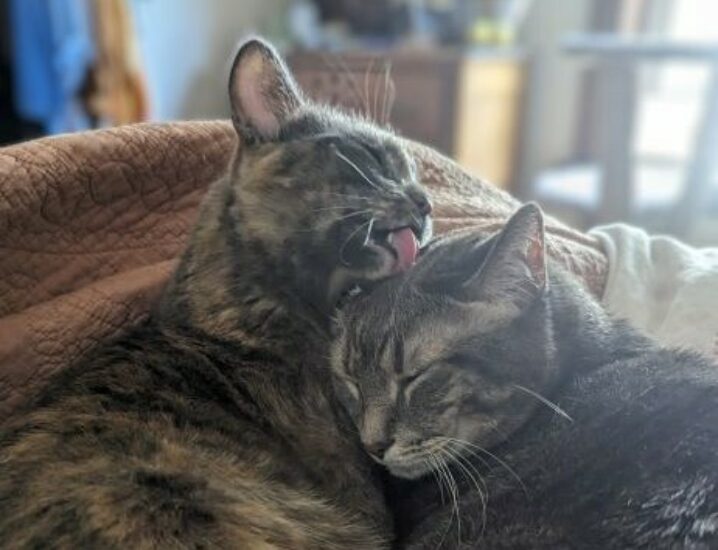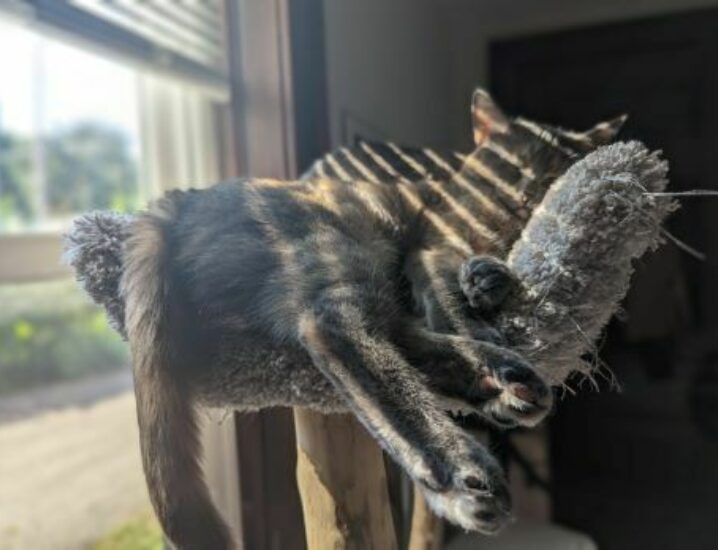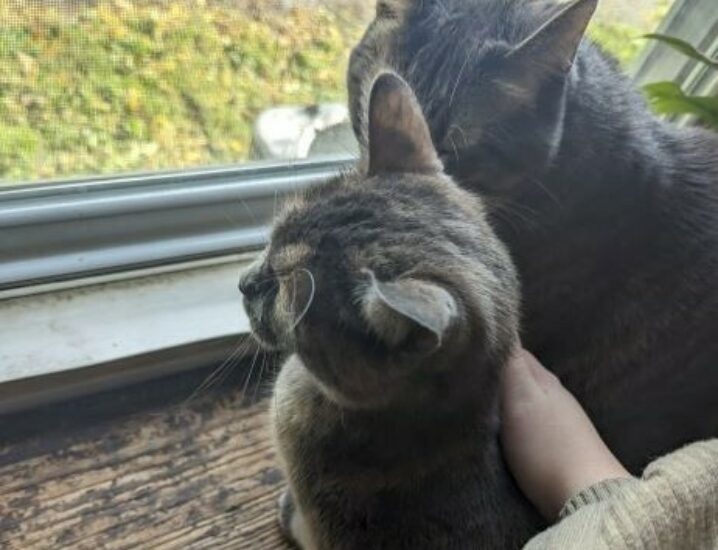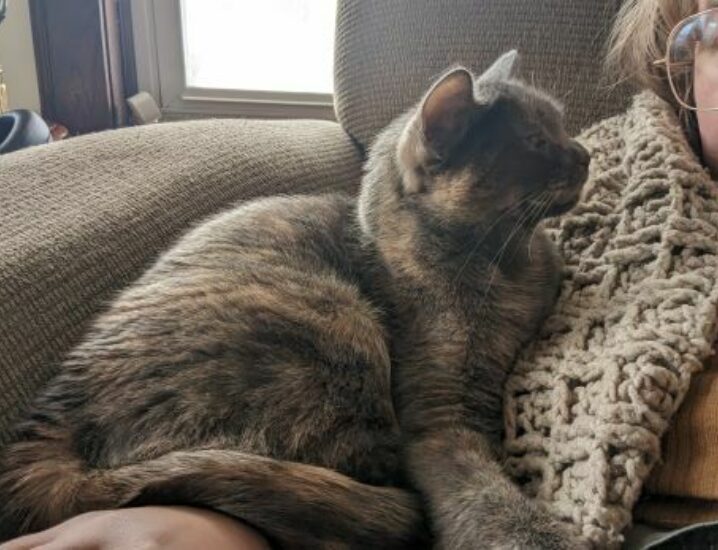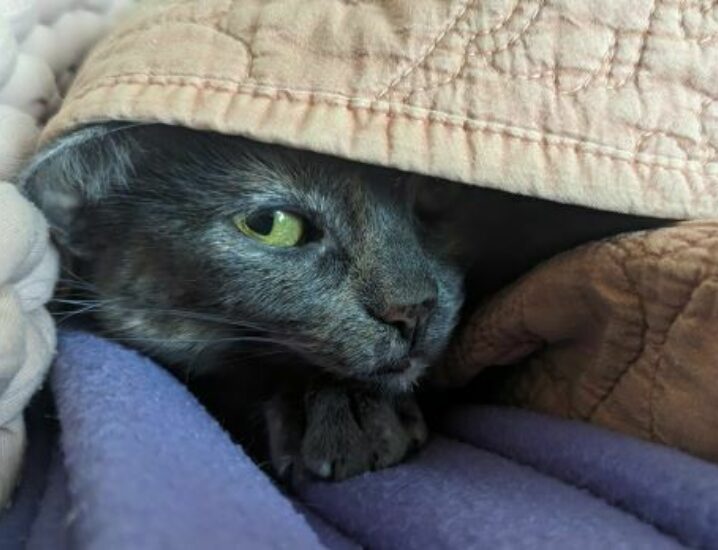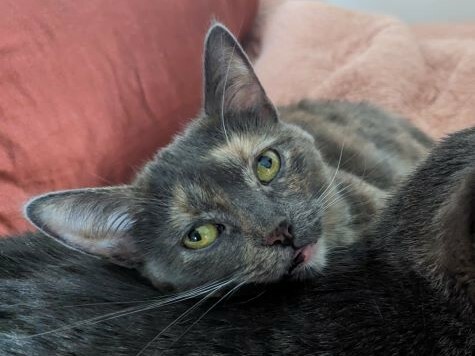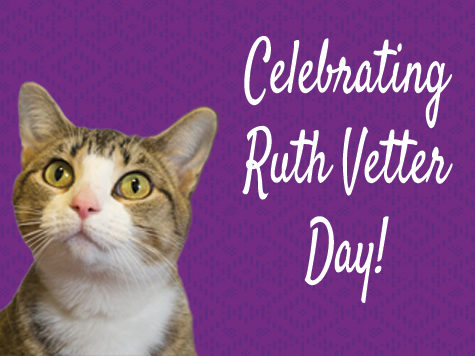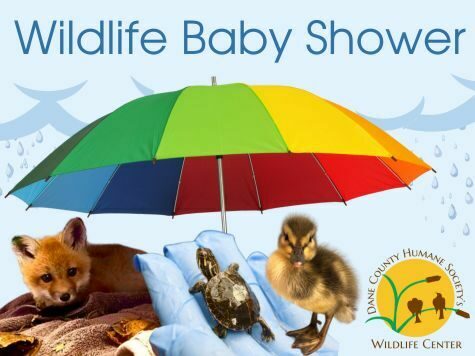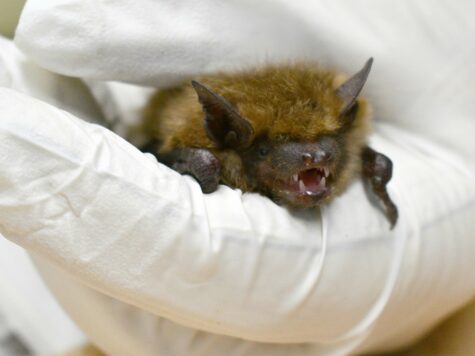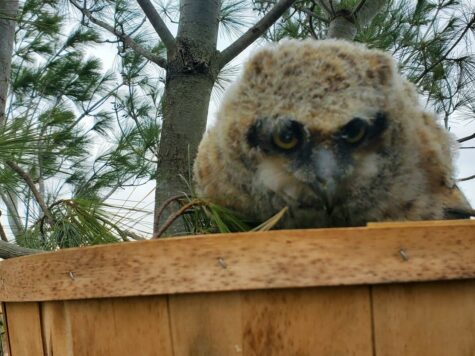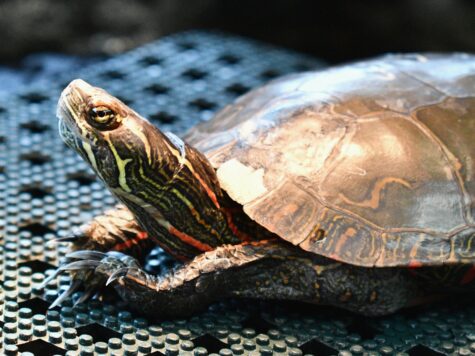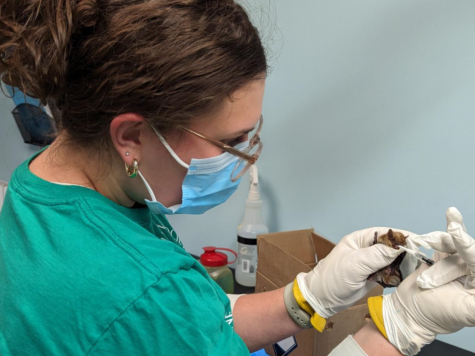“Sox is a very unique and lovely cat and we greatly appreciate you giving her a loving home,” Dr. Uri Donnett, Lead Veterinarian at Dane County Humane Society (DCHS), wrote in a note for potential adopters.
We didn’t realize how truly unique Sox was when she was surrendered with her mom and two other cats back in August 2022. Sure, she has unique physical traits that were obvious, like her underbite and unusual pupils. But there was a rare condition hiding underneath. This condition has only been seen in four cats at DCHS in the last five years, and all but one survived to go on to find new families.
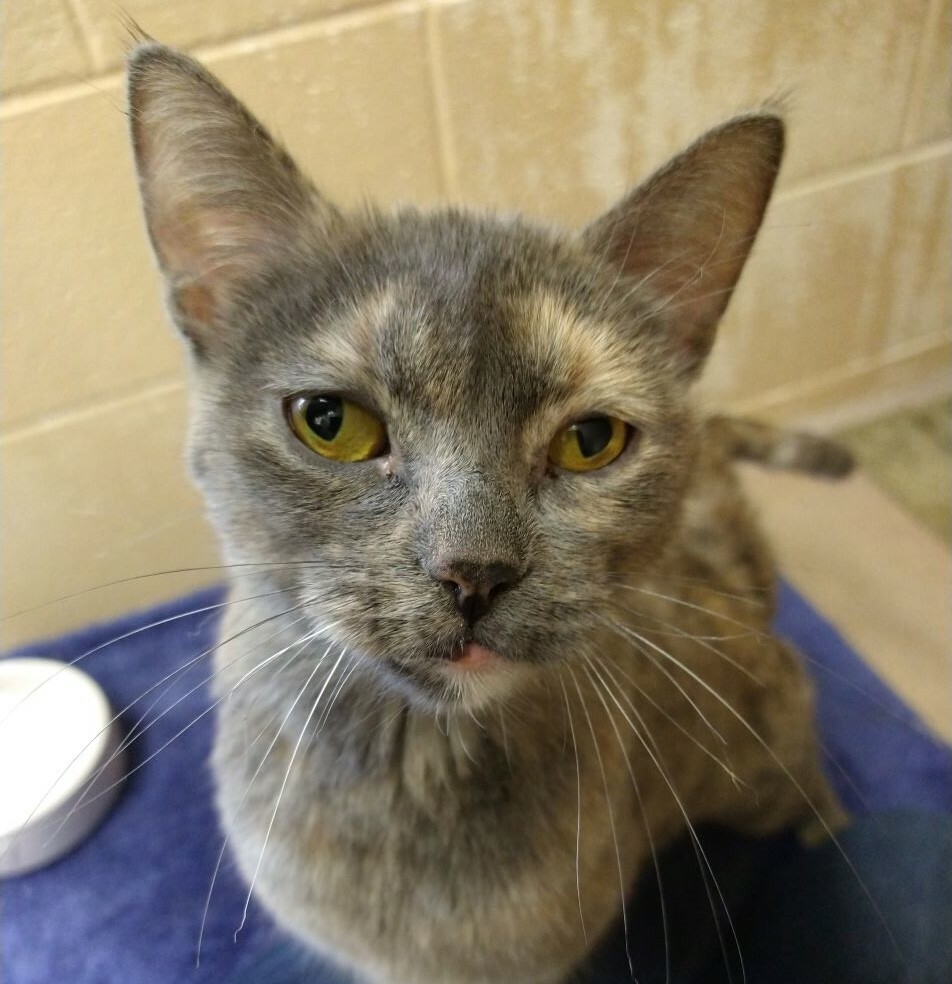
Sox had never been examined by a veterinarian before. DCHS veterinarians reviewed radiographs taken of Sox at the time she underwent her spay surgery and diagnosed her with a rare condition called Atresia Ani. It can present in different ways: the colon either doesn’t form completely and just ends in the abdomen, or it is complete but the connection out of the body doesn’t form correctly.
“Sox was a surprising case because she actually came to us as a young adult cat. She had been living with this condition her whole life, and it was caught at DCHS because of our observant volunteers who saw her straining in the litter box,” says Uri. Sox was crying in her condo when trying to defecate.
“This is a pretty unusual way to diagnose this type of case since, normally, they start to have issues related to the problem as kittens or puppies and often don’t make it to young adulthood without treatment,” adds Uri.
Sox was lucky to have survived into adulthood. She was even luckier to come to a humane society with an incredibly generous community that provides the resources we need to go above and beyond to save the lives of the animals coming through our doors.
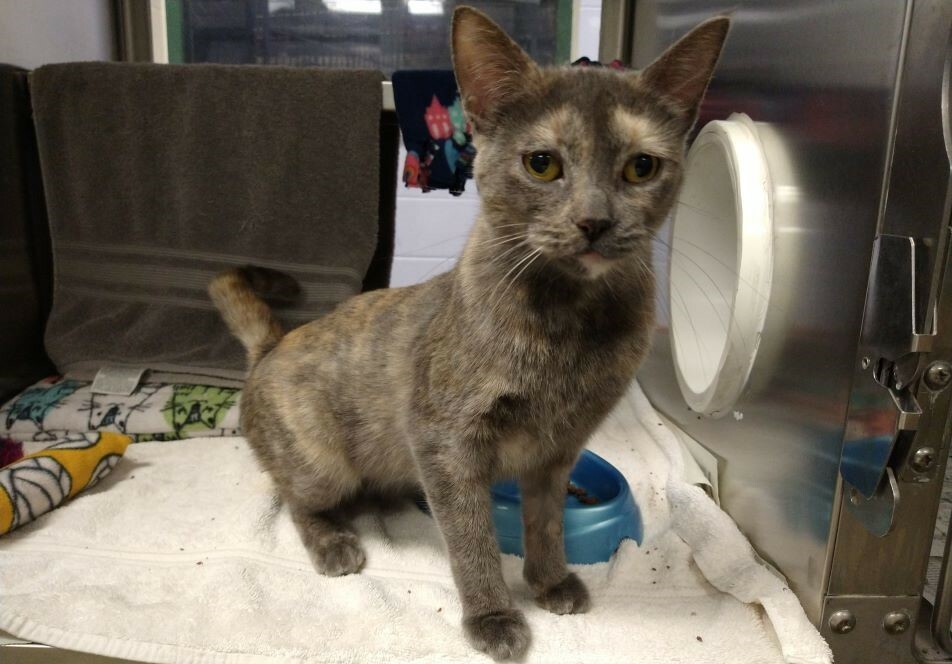
“In the case of Sox, her colon actually connected into her vulva, instead of to a separate rectum, and she had what we call a fistula,” explains Uri. “She was defecating from the same area that she was urinating from. Not only did this mean that the hole was too small for her to pass normal stools, but it also made her very prone to urinary tract infections.”
Sox was immediately started on Miralax to help loosen her stool to make it easier to pass, her food was switched to a gastrointestinal-friendly brand, and she was put on antibiotics and pain medication as DCHS vets reached out to local surgeons to correct the condition.
To help provide care and comfort for Sox as she waited to have her surgery, we reached out to our volunteer fosters. After hearing about Sox’s condition, foster mom Marian set up a space in a spare room for Sox complete with a hiding bed/tent, water, food, litter box, and toys.
“The challenges all revolved around trying to keep her as comfortable and happy as possible given her condition,” explains Marian. This was a challenge given the number of medications Sox was prescribed, and she did not like taking any of them. Also, Sox didn’t always use her litter box consistently because of the urinary tract infections her condition caused.
Despite her medical complication, Sox was a very friendly cat. “Sox is a pretty, sweet, and affectionate little love-bug,” says Marian, adding that she enjoyed having Sox curl up on her lap for attention and naps. “I feel lucky I had the chance to have Sox stay with me when she needed it,” says Marian.
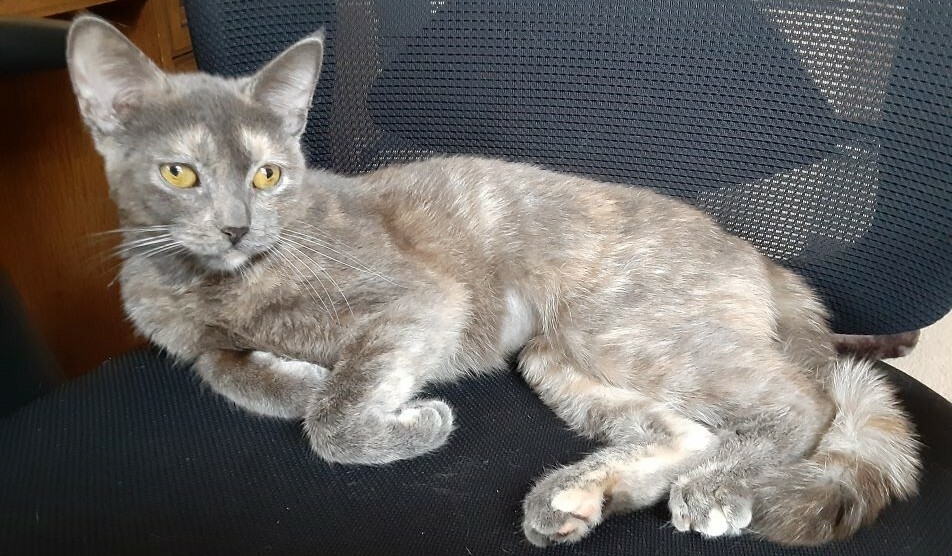
On September 29th, 2022, Sox received her life-changing surgery.
“We are very lucky that we have several surgeons who will volunteer their time to help animals at the shelter and to teach us how to perform these surgeries,” says Uri. Dr. Sara Colopy, a board-certified small animal surgeon at the University of Wisconsin School of Veterinary Medicine and a DCHS Board Member, performed the surgery while Uri observed and learned the procedure.
Uri explains it’s important for DCHS veterinarians to learn new skills so we can decrease length of stay and provide animals with any procedure they might need to be a viable adoption candidate.
“Especially now that all vet clinics are so busy, it can be harder for specialists to volunteer their time with us,” he says. “We also have several veterinarians on staff with an interest in learning new surgeries, so it is a great benefit of working at DCHS that we get to continually learn from other experts.”
After surgery, Sox returned to foster with Marian. Sox had her good and bad days as her body adjusted to its new function, and she was very frustrated with wearing the cone collar, according to Marian. Eventually, Sox lost interest in eating, wouldn’t swallow her medications, and wasn’t using the litter box well when having bowel movements. She was brought back to Animal Medical Services so our vets could provide additional medical care.
Eventually, Sox’s appetite returned, her digestive system was running better, and she was consistently using the litter box. She was finally able to start her next chapter and was made available for adoption in early November. Later that month, she was discovered by Anna and renamed Sossi.
“I had a few cats I wanted to meet when I went to DCHS, and Sossi was one of them,” says Anna. “Her photo was so cute, and I was enamored with the shelter's Lonely Hearts Club list.
“Sossi was the first cat they took me to,” Anna recalls. “She was in a separate area from the other cats since she was receiving special care. When the volunteer opened her kennel, she started investigating and meowing and even bumped me with her head once or twice. Small, sweet, goofy little vibe – I didn't need to look at other cats; I wanted this one.”
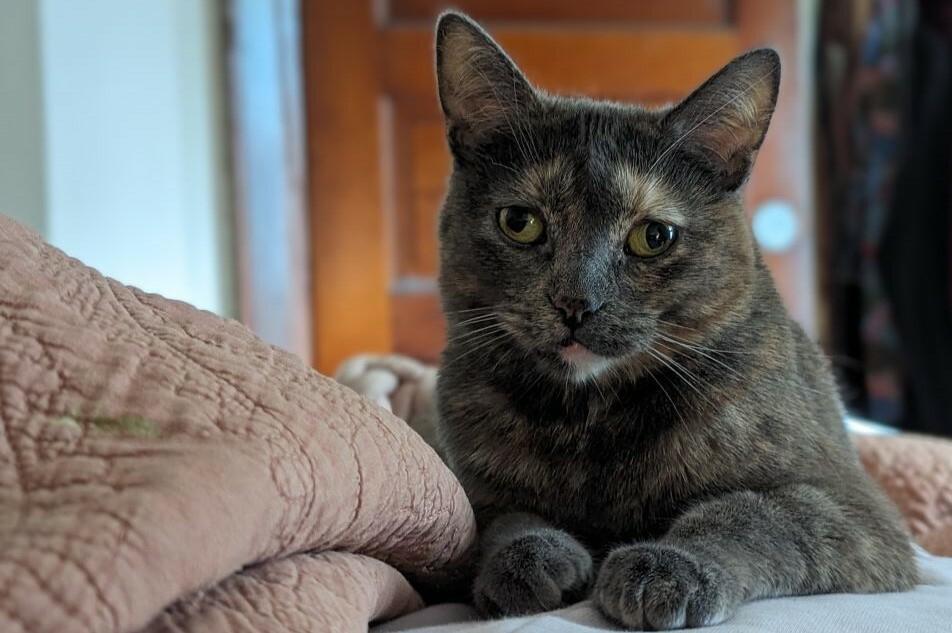
As part of every adoption look, DCHS shelter resource counselors discuss what we know about an animal’s medical and behavior history so each adopter goes home with as much information about their new pet as possible. In Sossi’s case, this included the notes written by our veterinarians about her rare condition and unique surgery – including Uri’s sweet thank you to Sossi’s future adopter.
“When they told me about her medical history and potential concerns, I just focused on absorbing the information,” says Anna. “I knew I wouldn't be able to turn her down even if it would be some work.”
Anna adopted Sossi on November 20th, 2022. She was patient with the new addition to her household and gave Sossi what she needed to adapt to her new environment.
“It's been a little bit of a process since bringing her home,” says Anna. “She's a nervous gal who initially did not like my other cat, she had litter box issues at first, and she's been diagnosed with asthma in addition to her original conditions. A huge adjustment for me from my first cat, who's been a low-maintenance lap cat since I brought him home. But thankfully, we've gotten her toilet act cleaned up and her medications seem to be working well. During the day, she likes to nap near or next to my other cat. In the evening, she loves to chase a wand toy or – perhaps her greatest passion – spin a ball around a track. The cats are spoiled with places to sleep, but many mornings I wake to her curled in the crook of my knee.
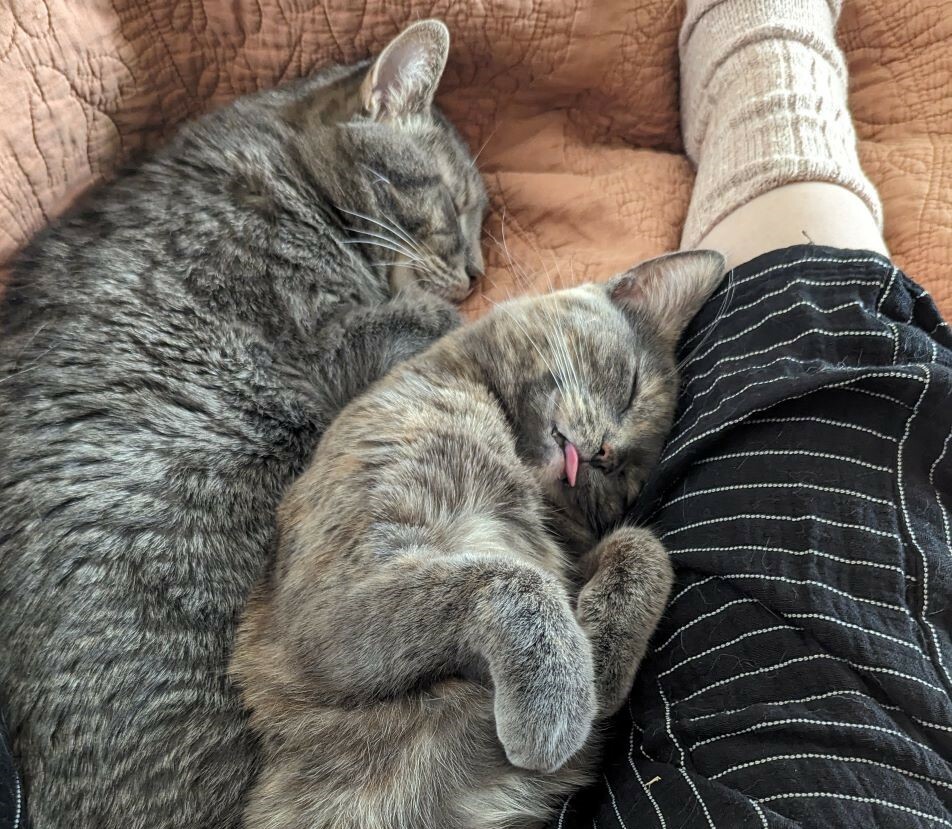
“I'm so thankful I brought her home and seem to have earned her trust,” Anna continues. “I love bragging about her, as she is unique from nose to tail – because of her surgery, I usually tell people she has a designer butthole.”
It’s thanks to our incredible community’s generosity that DCHS’s veterinarians could learn a new procedure and provide Sossi the surgery she needed before she could start her happy new life. Give today and double your impact for animals like Sossi.
